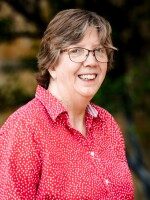This book may contain language, sexual content, and themes of grief and loss, which may be challenging for some readers. Reader caution advised.
Fond Hopes Lie Buried Here
by Mildred Rugger
Hi, everyone. This is Mildred Rugger from Canyon, Texas, for the 2025 Fall Read of HPPR Radio Readers Book Club.
Late Migrations by Margaret Renkl has an important subtitle: A Natural History of Loss and Love. In my third book byte, we’re going to explore that idea of loss, especially loss through death. Margaret brings us face-to-face with loss and death many times and in many ways. We learn of declining health, changing relationships, and the eventual death of several family members. We observe competitors and predators—both natural and human—causing death and destruction among the flora and fauna in her neighborhood.
The most heartbreaking type of loss we glimpse involves the death of the young. For parents, this grief is so very heavy. If you have experienced such a devastating loss, please be gentle with yourself in deciding when or if you want to listen to the rest of this book byte. It will hint at comfort for this heavy grief, but most of the comfort comes in my final book byte.
Let’s look at a pair of essays. “Blood Kin” (pp. 18-19) starts with a lovely family scene with four generations, including a toddler and another child on the way. It ends with weeping. “Nests” (pp. 20-21) begins with the statement, “Oblivion would be easier.” It ends with wonder at the beauty of life. In this Radio Readers BookByte, we’re facing the weeping. In the next book byte, we’ll feel the wonder.
“Oblivion would be easier” (p. 20), Margaret says. Easier than what? Well, oblivion would be easier than knowing that a cottontail may have a wonderful, hidden nest, only to see a snake find the nest and eat the young. And oblivion would be easier than knowing that small birds may hide their eggs and their nestlings, only to have them discovered and destroyed by larger birds.
And why the weeping? Well, weeping because of the country cemeteries with lots of small graves marked with words such as “Many fond hopes lie buried here” (p. 18). And weeping because of the miscarriages that Margaret felt might crush her. At least until her grandmother shared something with Margaret that no one else in the world knew. Her grandmother’s third child had been born “so early he had no name” (p. 19). Her grandmother wept, too—for a long time, but at night so she could still work during the day.
Why did it help Margaret to hear this from her grandmother? She doesn’t say. My guess is that her grandmother’s shared suffering somehow made Margaret feel seen. And it somehow gave Margaret enough courage to be engaged in life without denying her grief. The presence of an empathetic person can bring comfort in suffering.
This is Mildred Rugger for HPPR Radio Readers Book Club, wishing us all a growing awareness of the beauty of life, even in the midst of grief.







![”THE GRAPES OF WRATH (1939; awarded the Pulitzer Prize for fiction in 1940). Inevitably also 1962 Nobel Literature Laureate's tale of the migrating Joad family is surely the most emblematic novel of the American Great Depression. This [collector’s] pristine copy of the first state carries with it the exceedingly rare advance review slip with an author painting by Stjernstrom, first appearing as the frontispiece for the Lewis Gannett's edition and also the1939 "’John Steinbeck: Personal and Bibliographical Notes.’"](https://npr.brightspotcdn.com/dims4/default/e6680cb/2147483647/strip/true/crop/728x406+0+15/resize/280x156!/quality/90/?url=http%3A%2F%2Fnpr-brightspot.s3.amazonaws.com%2F5d%2Ff4%2F6478fdb44fa2a0faf908d4d61d3f%2F005-01-16-26-boo0kbyte-reading-and-re-reading-this-classic-berzanskis-the-grapes-of-wrath-card.jpg)


